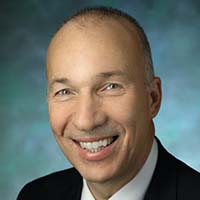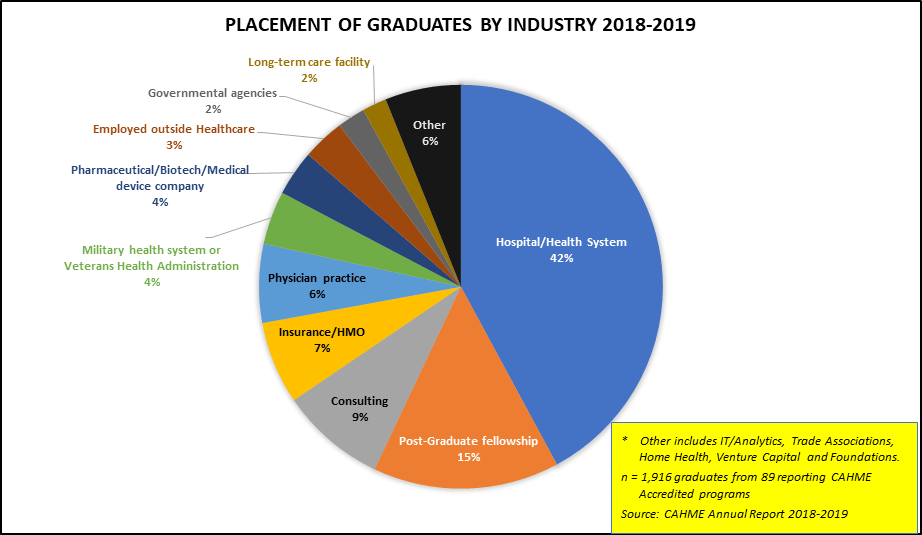Meet the Expert: An Interview with CAHME President & CEO Dr. Anthony Stanowski
MHA Search
For the latest academic year, we have 170 schools in our MHAOnline.com database and those that advertise with us are labeled “sponsor”. When you click on a sponsoring school or program, or fill out a form to request information from a sponsoring school, we may earn a commission. View our advertising disclosure for more details.
What’s wonderful about CAHME is that each year 250 volunteers give generously of their time in service of our mission: to advance the quality of healthcare education.
Dr. Anthony Stanowski, President and CEO of the Commission on Accreditation of Healthcare Management Education (CAHME)
At a time when discussions about essential services are highly politicized in the United States, one issue stands out in its ability to galvanize consensus: healthcare.
Among the numerous political issues, research shows the majority of Americans agree that affordable access to healthcare coverage is a top priority. In fact, a survey conducted by the Pew Research Institute in 2018 shows that 60 percent of Americans believe it is the responsibility of the federal government to ensure healthcare coverage for all. Nearly ten years after the implementation of the Affordable Healthcare Act, the healthcare sector has experienced immense growth and the number of insured Americans has increased which are two key factors contributing to the public support for healthcare.
A more recent survey conducted by the Wall Street Journal and NBC News in 2019 reveals the number one issue for presidential and congressional candidates to address in the 2020 elections is healthcare, which is ranked ahead of job creation, climate change, and other critical issues in public opinion polls.
Fortunately, public support for expanded healthcare also means increased job growth for clinicians and healthcare management professionals. Aspiring healthcare management professionals are advised to seek out high-quality educational programs. The leading accrediting organization for healthcare management education programs is the Commission on the Accreditation of Healthcare Management Education (CAHME).
Healthcare leadership attracts professionals of varied backgrounds and healthcare management careers in the United States are experiencing prodigious growth. Occupational data from the U.S. Bureau of Labor Statistics (BLS) projects job openings in medical and health services management will grow 18 percent nationally between 2018 and 2028—a rate which is much faster than the national average of all occupations (BLS 2019). Translated into real numbers, an estimated total of 71,600 healthcare management jobs are anticipated to be created during that decade (BLS 2019).
Most entry-level positions require a bachelor’s degree, but increasingly more organizations are requiring healthcare management applicants to have a master’s degree in healthcare administration (MHA), master’s of public health (MPH), or a master’s of business administration (MBA) with a healthcare specialization.
With career growth on the rise in the healthcare management sector, one question remains for prospective job seekers in this competitive: how can one determine the quality of a healthcare management program? The answer is program accreditation.
Read on to learn more about the leading accrediting organization for graduate-level programs in healthcare management from the President and CEO of CAHME, Dr. Anthony Stanowski.
What is CAHME?
For more than 50 years, CAHME has served the public interest by advancing the quality of healthcare management education on a global level. In order for healthcare to be delivered efficiently and effectively, CAHME exists to ensure that healthcare management programs are attracting the most talented, knowledgeable, and dedicated professionals through maintaining high standards of academic rigor.
CAHME has accredited 106 programs and emphasizes key competencies in its academic curriculum standards as well as practical experiences. Not only does CAHME set high and measurable standards of programmatic excellence, but the organization is also committed to supporting healthcare management programs in meeting or exceeding their accreditation criteria by providing transparent access to its program standards.
Why is CAHME Accreditation Important?
In all areas of academia, accreditation exists to uphold high standards of academic excellence at the institutional and programmatic levels. Accreditation serves prospective students and employers by providing evidence of an organization’s commitment to high educational quality and continuous improvement.
CAHME provides programmatic accreditation for graduate-level healthcare management programs and is recognized by the Council on Higher Education Accreditation (CHEA) as the only organization of its kind to grant accreditation to individual academic programs in this field. It stands to reason that CAHME is the gold standard for healthcare management programs and future healthcare management professionals would be well-served to invest their time and money into a CAHME-accredited program to receive a solid theoretical and practical educational experience.
Prospective employers have much to gain from hiring graduates from CAHME-accredited programs in that they can be assured that students from this program have received meticulous instruction and gained invaluable leadership experience they can apply in their future careers with a healthcare organization.
Fast Facts on CAHME-Accredited Graduate Programs in Healthcare Management
- Year CAHME was established: 1968
- Number of CAHME-accredited healthcare management programs: 106
- Number of CAHME programs in the candidacy stage: 24
- Number of participants in CAHME Bootcamps in 2019: 81
- Number of CAHME volunteers who provide annual service to the organization: 250
A Conversation with CAHME President & CEO Anthony Stanowski, DHA, FACHE

Dr. Anthony Stanowski was appointed as the president and CEO of CAHME June 20, 2016. His initial involvement with CAHME was when he graduated from a CAHME-accredited program in 1984; in 2011, he was appointed as a board member.
Dr. Stanowski has extensive leadership experience in healthcare organizations, including the Aramark Corporation, Thompson Reuters, and several academic and community-based health systems. He has served on the boards of health systems and in governance with the American Hospital Association. Notably, he is a frequent presenter at healthcare conferences and the co-author of We Have A Match: My Journey through America’s Transplant System, which details the challenges of providing a positive patient experience in the transplant system.
In an interview with MHAOnline, Dr. Anthony Stanowski graciously shared his enthusiastic vision for the future of healthcare management.
If a healthcare management professional has a graduate degree from a non-CAHME-accredited program, what professional development opportunities are available to them?
Dr. Stanowski explained, “CAHME accreditation helps to ensure that a student is well prepared to lead. It provides a solid foundation for your career. If a student doesn’t have a graduate degree from a CAHME accredited program, they should become active members of one of the corporate members affiliated with CAHME that encourage life-long learning. These organizations share a high standard of professional quality with CAHME and provide their members with the latest and best practices in healthcare management.”
Dr. Stanowski recommends that healthcare leaders pursue professional development opportunities with the following organizations:
- American College of Healthcare Executives (ACHE)
- American Hospital Association (AHA)
- Association of University Programs in Health Administration (AUPHA)
- Healthcare Financial Management Association (HFMA)
- Medical Group Management Association (MGMA)
- National Association of Healthcare Quality (NAHQ)
What’s a CAHME Bootcamp and who should attend?
“CAHME Bootcamp is a one-day event for graduate-level academic program professionals who want to learn how to earn CAHME accreditation for their organization,” said Dr. Stanowski. “CAHME Bootcamp is a single-day interactive event featuring two in-person modules and requires some content-based asynchronous online pre-work prior to the one-day session.”
Dr. Stanowski added, “There are two groups of people who should attend CAHME Bootcamp. The first group comprises academics who want to learn how to become CAHME-accredited and believe that their program has what it takes to earn accreditation. The second group are practitioners and academics who want to become site visitors.”
Who are the members of the CAHME Standards Council and what are their qualifications?
“The CAHME Standards Council is a core group of professionals who develops the standards for accreditation and reviews them over time,” explained Dr. Stanowski. “The CAHME Standards Council is made up of leading practitioners and academics who want to give back to the profession and make sure that the students graduating from today’s healthcare administration programs are meeting the requirements and needs of what is needed in the industry. The council is made up of 12 members who are professors and directors of healthcare administration or hold senior leadership positions in healthcare organizations.”
Dr. Stanowski went on to share his reverence for CAHME’s dedicated leadership and committee members: “Our council is made up of multiple health system CEOs, leading academics, and also includes the President of the Malcolm Baldrige Foundation, which promotes performance excellence across all economic sectors. What’s wonderful about CAHME is that each year 250 volunteers across all committees and as site visitors give generously of their time in service of our mission: to advance the quality of healthcare education.”
How can university programs best support their teaching faculty to meet the rigorous CAHME accreditation standards?
“We look at how well faculty are supported by their departments in leadership roles,” said Dr. Stanowski. “Other factors CAHME standards consider are how are faculty supported to pursue research and scholarship? Are faculty members of leading professional organizations such as AUPHA and investing in their own improvement? Is there a culture of diversity and inclusion? Do faculty participate in health-related community and professional activities to draw upon their experience in their teaching?”
Faculty may also want to become CAHME site visitors to get involved in the peer-review process.
Does CAHME aim to accredit research-prolific R1 and R2 universities?
“CAHME looks at overall program quality, regardless of R1 or R2 research status,” remarked Dr. Stanowski. “CAHME-accredited programs are located in high-end research institutions and universities that are focused on working students. When we ask programs seeking accreditation what their mission statements are—we’re not looking for general answers. We’re looking for how their mission defines the focus of the program, including their target student audience. How is the curriculum designed to enable their graduates to advance, whether that is to the C-suite or to upper-level leadership? And how does the program evaluate how well it is meeting its goals?”
What occupational trends do you predict healthcare administrators will face in the next five years?
In 2018, CAHME celebrated its 50th anniversary and released a video series and white paper titled Getting to 100: Preparing Healthcare Leaders for the Next 50 Years. Key stakeholders in CAHME (including knowledgeable leaders in the field of healthcare administration) collectively called for the current rigorous academic standards to be upheld to ensure that healthcare management professionals are well-prepared for future changes in an industry that is constantly evolving.
Dr. Stanowski remarked: “50 years ago when CAHME came into being, it was about educating people to be hospital administrators. Nowadays, only 42 percent of CAHME program graduates go on to work as hospital administrators and 15 percent go into postgraduate fellowships in physician practice management.”

He added, “The future for the next five years in healthcare management is being discussed by the CAHME Standards Council with the guiding question: How do we prepare students to succeed in healthcare?”
Is there anything else you would like to share about CAHME?
Dr. Stanowski closed with this insight: “Healthcare is undergoing rapid change. I think when you choose a program that’s CAHME-accredited, you’re looking at a program that’s robustly comparing itself to other programs on a broad spectrum, is attuned to the healthcare environment, and is making sure that students are prepared. CAHME is all about ongoing program improvement. We stand by our mission: to advance the quality of healthcare management education.”

